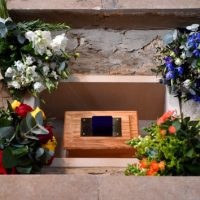
 Ben Stansall – WPA Pool /Getty Images(LONDON) — Stephen Hawking, a giant of science and celebrated British physicist who died in March, was honored Friday before more than 1,000 people at London’s Westminster Abbey, where his ashes were buried.
Ben Stansall – WPA Pool /Getty Images(LONDON) — Stephen Hawking, a giant of science and celebrated British physicist who died in March, was honored Friday before more than 1,000 people at London’s Westminster Abbey, where his ashes were buried.
Hawking, who died at 76 after a lifelong battle against terminal motor neuron disease, was a groundbreaking physicist and mathematician.
Studying at Oxford and Cambridge University, he was diagnosed with the debilitating illness at age 21.
At the time, doctors expected him to be dead in another two years.
More than 3,000 people have been buried or commemorated at London’s Westminster Abbey, one of the capital’s most historic and recognized landmarks.
In a section of the Abbey lies Poets’ Corner, where a number of distinguished poets and playwrights are buried, and nearby is Scientists’ Corner where some of Britain’s greatest scientists and thinkers are buried.
Sir Isaac Newton and Sir Charles Darwin are buried in Scientists’ Corner, and it is between their graves that Hawking’s ashes were buried beneath a stone seal engraved with his most famous equation describing the entropy of a black hole with the words, “Here lies what was mortal of Stephen Hawking, 1942-2018.”
More than 100 nationalities were represented among the congregation for the service, and more than 25,000 applied for the lottery of 1,000 tickets to attend.
The ceremony featured readings from British actor Benedict Cumberbatch, who played Hawking in a 2004 biopic, and the British astronaut Maj. Tim Peake.
As part of the ceremony, a recording of Hawking’s words was set to music by Vangelis, the Greek composer who created the theme music for the 1981 film “Chariots of Fire.”
The broadcast is to be beamed into the nearest black hole, 1A 0620-00, by the European Space Agency via a satellite in Spain.
His daughter Lucy said his words were “a message of peace and hope, about unity and the need for us to live together in harmony on this planet.”
Among his work, Hawking was best known for his research on black holes, and his theory that they emitted radiation that came to be known as “Hawking’s radiation.”
His landmark book, “A Brief History of Time,” has sold more than 10 million copies.
Hawking wrote the book in order to help explain the structure and origin of the universe to everyday readers with little background knowledge of physics or cosmology.
Among the guests who attended Friday were volunteers from the opening ceremony of the London 2012 Paralympic Games, and a number of disability activists, who paid tribute to Hawking’s fortitude, perseverance and unerring dedication to science as the disease slowly claimed all use of his limbs and muscles, eventually leading him to rely on a synthesizer to communicate.
One guest was Rose Brown, a student from the National Star College in England, which is for young people with disabilities.
She, like Hawking, spoke through a synthesizer and paid tribute to the late professor:
“I’m going to be an actress; everybody who puts their mind to something gets to be it. Stephen Hawking proved that more than anyone.”
Copyright © 2018, ABC Radio. All rights reserved.















